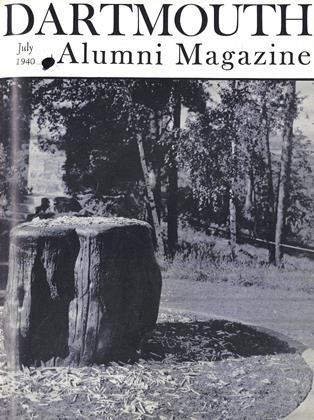Undergraduate Editors See Older Generation Teach Ideals And Principles Now Changed Without Notice
(Reprinted from THE DARTMOUTH forJune 16, 1940.)
IN THE CHAPEL THIS MORNING PresidentHopkins spoke about this country andthe war for his generation. He spoketo our generation. The things that his generation believes are printed in the text ofhis speech, the things that our generationbelieves were printed in yesterday's editorial column. There is little remedy forthe disagreement of fact, but there isremedy for the implication that we are unwilling to stand upon our feet, to face responsibility.
We stand upon our own feet and uponour own thinking, we ache to fight a battle.But the battle that we want to fight as westand is against a different enemy. We arepledging our lives to the fight for democracy as a way of life, not just as a politicaltheory, to the fight against geographic,racial and income-bracket disunion thatbreeds a fascism of fact whatever name ithides under—the fascism of suppressedminorities, of compulsory military training, of property and false nationalismplaced ahead of human welfare.
But the important thing is that our beliefs are not based on fear or evasion. Theyare based on the traditions of the liberalcollege which ask men to think as well aslisten, to walk straight instead of followwithout question. For the fullest statementof this process of our beliefs, we reprint below an editorial from THE DARTMOUTH ofMay 24,1940.
FATHERS AND SONS
A study of the post-war generation-our generation in college and just out of it-would probably lead one into the belief that the key to its attitude lies in the words "post war." It is a generation which has not had to fight for itself, but which has been brought up to believe that fighting does not accomplish anything. It is a generation which has been told by its parents that in war today, the winner takes nothing, because nobody wins.
It is a generation which has been spoiled in many ways. Its parents, the parents of most of us in Dartmouth College today, have done what they could to make life easy for the entire generation. Its disillusion comes not from what its members have been through as individuals, but from what it has been through as a group. It has been through a wave of post-war literature written by men who called themselves lost. It has been through classrooms conducted by men who have had their hopes for democracy and just government shattered by the last war, and who did not hesitate to tell their pupils of their own disillusionment. Most of its members who are still in college have had little responsibility of their own to shoulder. In this they are not so very different from any generation. Many of our fathers had their formal education and then were surprised to find that the world was something more than a theoretical machine functioning for the benefit of the better people.
Now the older generation has a chance to see what it has taught us, and it is dissatisfied with its work. The same teachers who told us that we should avoid involvement in a European war at any cost are now telling us that we are cowards, or proNazis, because we listened to what they taught us about forming independent judgments, independent belief. The parents and teachers who wanted to give us a solid foundation on which to rest our responsibilities are now saying that we are weak, because we do not accept the easy responsibility they wish us to accept.
Accepting without question the responsibility they wish to place on us would be too easy, too easy because unthinking. It would also be counter to everything they have taught us, counter to their hard doctrine that faiths must be examined before they are accepted. Most of us have learned the lesson too well: we believe what they told us, and we ask to make our own decision now, as they have asked us to make it in the past. Of course there are some of us who start with the premise, "No war," and then rationalize a defense of that premise; but there are many of us who still hold ideas we would fight for, who insist on determining for ourselves what those ideas shall be. If it is shocking to them to see how unwilling we are to accept their decision, it is also shocking to us to see how readily they have swung back in their own thinking toward everything they warned us against.
If they want their own lives to mean anything, they must ask us to achieve our own values, the hard way they taught us, and fulfill our own responsibilities, as educated men who are also honest and courageous.
 View Full Issue
View Full Issue
More From This Issue
-
 Article
ArticleCommencement Climax of 171st Year
July 1940 -
 Class Notes
Class NotesThirtymen Celebrate With Record 265 Reuners
July 1940 By BUD FRENCH '30 -
 Class Notes
Class NotesThirtieth Reunion of 1910
July 1940 By H. P. HINMAN -
 Class Notes
Class NotesGreat Twenty-Fifth for 1915
July 1940 By DONALD C. BENNINK -
 Article
ArticleBaccalaureate, 1940: The Upright Man
July 1940 -
 Article
ArticleDartmouth Remembers' Craven
July 1940
Article
-
 Article
ArticleDr. Tucker of Dartmouth
NOVEMBER, 1926 -
 Article
ArticleContributions by Classes in the 1951 Alumni Fund Campaign
December 1951 -
 Article
ArticleA Wah Hoo Wah for –
DECEMBER 1966 -
 Article
ArticleYou're a V.I.P.* To the A.R.O.
January 1949 By CHARLOTTE E. FORD -
 Article
ArticleWas It Something In The Water?
MAY 1999 By F.K. -
 Article
ArticleALUMNI ASSOCIATION OF CHICAGO
March, 1924 By Warren D. Bruner


